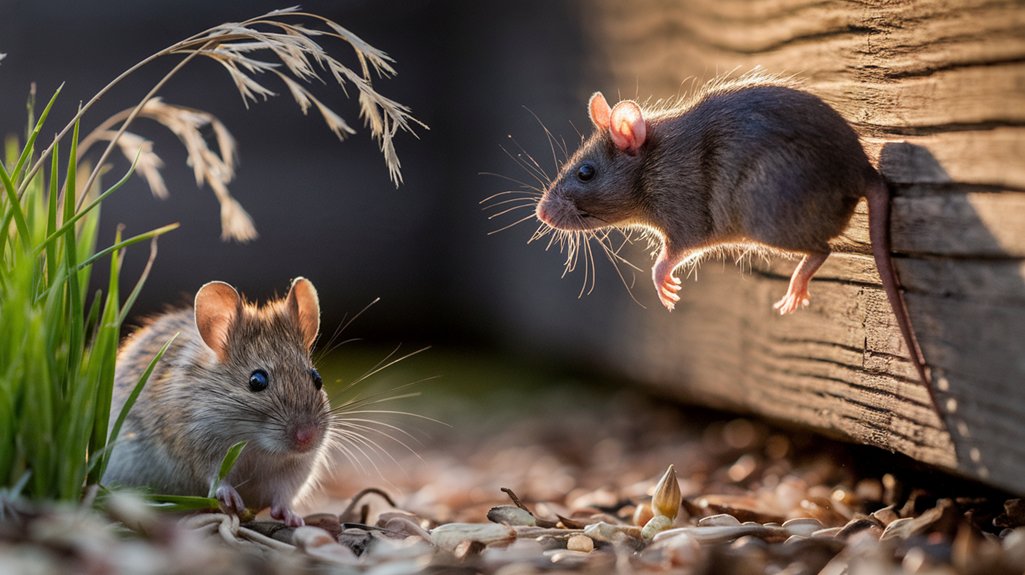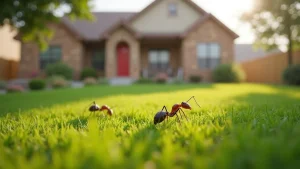If you’re living in Colorado, you might encounter a few common rodent species like the deer mouse and Norway rat. These pests can invade your space, bringing various health risks along with them. Recognizing the signs of an infestation early can save you a lot of trouble. So, what can you do to prevent these critters from making themselves at home? Let’s explore effective strategies and methods for dealing with these unwelcome guests.
Common Rodent Species in Colorado
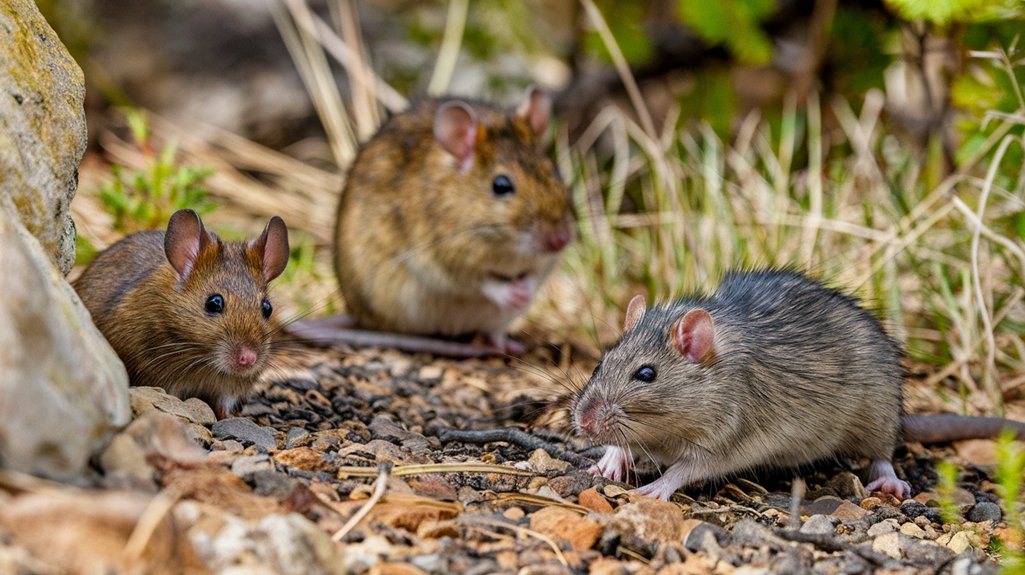
When exploring the diverse wildlife in Colorado, you’ll likely encounter several common rodent species that play vital roles in the ecosystem.
One of the most notable is the deer mouse, which thrives in forests and grasslands. They prefer habitats with plenty of cover and food sources, making them common in rural areas.
Then there’s the house mouse, which favors human structures, often seen in urban environments. Their breeding habits are prolific; females can produce several litters each year.
Another common species is the Norway rat, typically found near water sources, which also adapt well to human habitats.
Understanding their habitat preferences and breeding habits can help you appreciate these small but impactful creatures in Colorado’s rich biodiversity.
Identifying Signs of Rodent Infestation
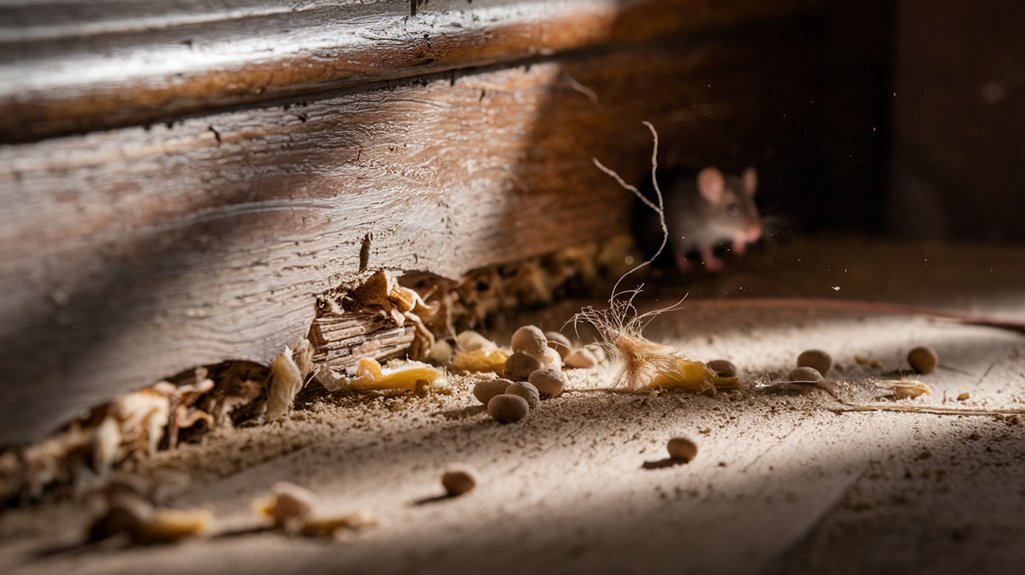
Recognizing the signs of rodent infestation is key to protecting your home and health. Start by looking for droppings identification; these small, dark pellets are often found near food sources or nesting areas.
Different rodents leave different droppings, so knowing what to look for can help you identify the specific pest. Next, check for nesting signs, such as shredded paper, fabric, or insulation tucked away in hidden corners.
You might also notice gnaw marks on furniture or walls. Additionally, listen for scratching noises in the walls or ceilings, especially at night when rodents are most active.
The sooner you detect these signs, the quicker you can take action to address the issue.
Health Risks Associated With Rodents
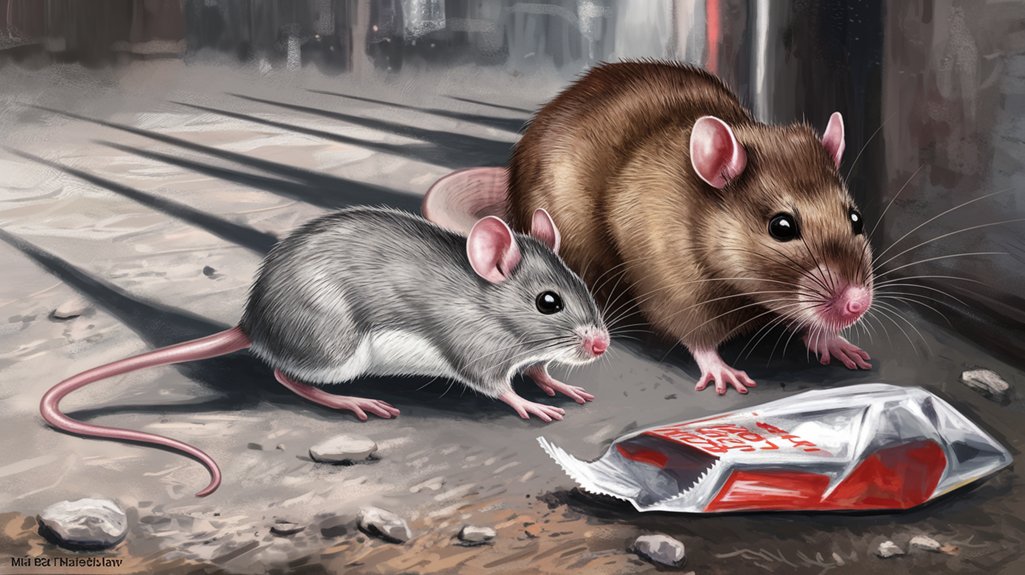
Rodents can pose serious health risks to you and your family, especially if they invade your home. They carry various rodent borne diseases, such as hantavirus, leptospirosis, and salmonella, which can severely affect your health.
When these pests scurry through your living space, they can contaminate surfaces, food, and water sources, increasing your risk of illness. Zoonotic transmission, the process by which diseases are transferred from animals to humans, is a significant concern with rodent infestations.
You mightn’t even realize you’re at risk until symptoms arise. Keeping an eye out for signs of infestation is crucial, as early intervention can help protect your family’s well-being and prevent serious health complications associated with these unwanted guests.
Colorado Rodent Control protects your home. Learn pest tips from Colorado State University Extension.
Effective Prevention Strategies
To keep rodents at bay, it’s essential to implement effective prevention strategies throughout your home.
Start with habitual cleaning; regularly sweep, vacuum, and wipe down surfaces to eliminate food particles that attract pests. Don’t forget to store food in airtight containers and promptly dispose of trash.
Next, focus on structural maintenance. Inspect your home for gaps or cracks in the walls, windows, and doors, and seal any openings to block entry points. Repair leaky pipes and remove standing water to deter nesting sites.
Lastly, keep outdoor areas tidy by trimming shrubs and removing debris, as these can serve as hiding spots.
DIY Rodent Control Methods
After you’ve implemented prevention strategies, it’s time to tackle any existing rodent issues using DIY methods. You can create effective homemade traps and use natural repellents to keep rodents at bay. Here are a few effective approaches:
| Method | Description |
|---|---|
| Homemade Traps | Use a bucket trap with a ramp and bait to catch rodents. |
| Natural Repellents | Mix peppermint oil with water and spray in areas where rodents frequent. |
| Ultrasonic Devices | These emit high-frequency sounds that deter rodents without harming them. |
When to Call a Professional Exterminator
Although DIY methods can be effective for minor rodent issues, there are times when it’s best to call in a professional exterminator.
If you notice signs of a larger infestation—like droppings, nesting materials, or gnawed wires—it’s crucial to act quickly. Ignoring these signs can lead to bigger problems, making a professional assessment necessary.
Additionally, if you’re dealing with persistent rodent activity despite your efforts, don’t hesitate to reach out for help. Professionals have the expertise and tools to tackle infestations safely and effectively.
Long-Term Solutions for Rodent Management
Addressing a rodent problem is just the beginning; implementing long-term solutions can prevent future infestations. Start by adopting sustainability practices, like sealing entry points, reducing clutter, and maintaining a clean environment.
These measures not only deter rodents but also promote a healthy ecosystem. Engage with your community to share knowledge and resources on effective rodent management. Organizing neighborhood clean-up events or workshops can foster collaboration and awareness, making it harder for rodents to thrive.
Additionally, consider using deterrents that align with your sustainability goals, encouraging others to do the same. By focusing on proactive strategies and community engagement, you’ll create a rodent-resistant environment that benefits everyone in the long run.
Eco-Friendly Alternatives for Rodent Control
When it comes to rodent control, eco-friendly alternatives can be both effective and safe for your home and the environment.
Natural repellents like peppermint oil or vinegar can deter rodents without harmful chemicals. Simply apply these substances in areas where you’ve spotted activity, and they’ll likely steer clear.
Additionally, using humane traps allows you to catch rodents without causing them harm. Once they’re safely captured, you can release them far away from your home.
To enhance these methods, keep your areas clean and seal any entry points to prevent future visits.
Frequently Asked Questions
What Are the Legal Regulations Regarding Rodent Control in Colorado?
When considering rodent control regulations in Colorado, you’ll need to follow legal pest management guidelines. Ensure you’re familiar with local laws to avoid penalties while effectively managing rodent populations in your property.
Can Rodents Transmit Diseases to Pets?
Yes, rodents can transmit diseases to pets, putting their health at risk. To ensure pet protection, keep your home clean, secure food sources, and monitor for any signs of rodent activity.
How Do Weather Changes Affect Rodent Behavior?
Weather changes influence rodent behavior significantly. You’ll notice seasonal adaptations as they seek shelter during temperature fluctuations. When it gets cold, they often invade homes, looking for warmth and food to survive.
What Types of Traps Are Most Effective for Different Rodents?
For effective rodent control, consider different trap types like snap traps or glue boards. Use enticing bait options such as peanut butter or seeds to attract them, ensuring your traps work efficiently for your situation.
Are There Specific Times of Year When Rodent Activity Increases?
Yes, rodent activity typically increases during warmer months due to seasonal patterns and breeding cycles. You’ll notice more activity in spring and summer as they seek food and nesting sites, making proactive measures essential.
In Colorado, dealing with rodents can feel overwhelming, but with the right strategies, you can keep them at bay. By identifying signs of infestation early and implementing effective prevention methods, you’ll reduce the chances of a bigger problem. Remember, DIY solutions can help with minor issues, but don’t hesitate to call a professional if things get out of hand. Stay proactive, and you’ll create a rodent-free environment for you and your family.
Colorado Rodent Control with Above & Beyond Services keeps your Denver home pest-free. Call (720) 806-6378 or visit Above & Beyond Services for free quotes on rodent control, pest management, and more.
Key Takeaways
- Common rodent species in Colorado include deer mice, house mice, and Norway rats, each with specific habitat preferences.
- Signs of infestation include droppings, nesting materials, gnaw marks, and scratching noises, which indicate rodent activity.
- Rodents pose health risks through diseases like hantavirus and contamination of food and surfaces, making monitoring essential.
- Effective prevention strategies include regular cleaning, proper food storage, sealing structural gaps, and maintaining outdoor tidiness.
- DIY control methods like homemade traps, natural repellents, and ultrasonic devices can help manage minor rodent issues effectively.

